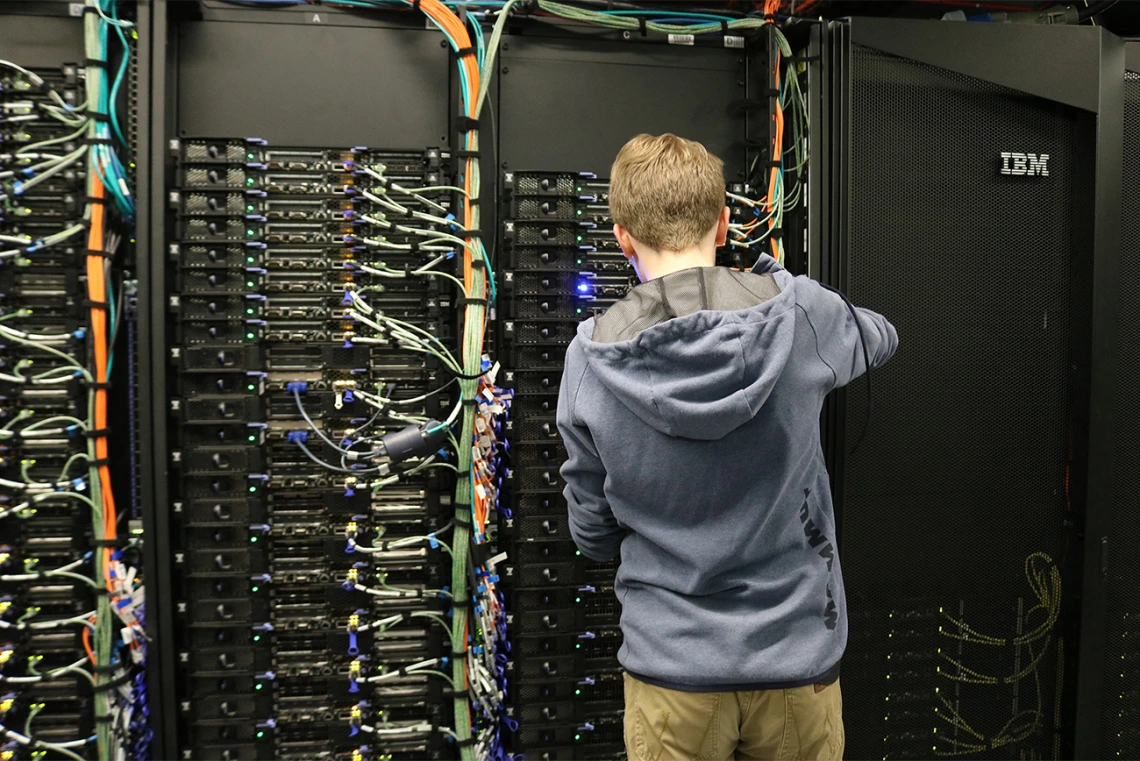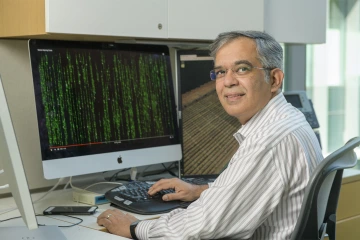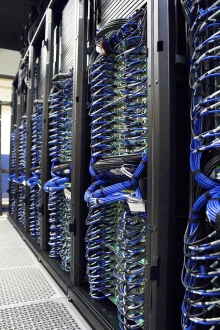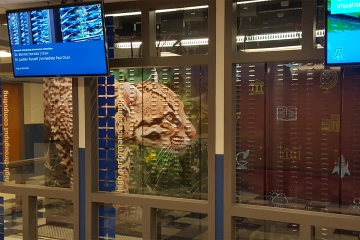Scaling Up Strengths to Make UArizona Health Sciences a Health Analytics Powerhouse
A focus on computing technology is positioning the University of Arizona Health Sciences to take advantage of the ever-increasing research opportunities afforded by big data.

Big data is getting bigger. When the National Institutes of Health’s All of Us Research Program meets its participation goal, for example, researchers will have access to health data from more than 1 million people in one of the world’s largest and most diverse databases for health research.
Doing better at solving today’s increasingly complex health care problems requires deeper insight into much more data.

Nirav Merchant helps researchers leverage the power of big data and become better data stewards.
The good news is advances in computing and informatics are opening myriad ways to analyze health information. The challenge is to develop the resources required to take advantage of the opportunities.
The University of Arizona Health Sciences’ solution? A strategic initiative to create a health analytics powerhouse that will expand access to centralized, HIPAA-compliant computers.
Step one is to build upon the robust infrastructure the university has developed to support researchers with their computing needs.
“This initiative is about our campus trends and our community,” said strategic initiative leader Nirav Merchant, director of the Data Science Institute and director of cyber innovation in the Office of Research, Innovation and Impact, and a member of the BIO5 Institute. “We are genuinely building on institutional investment and strengths.”
Enabling Data-driven Health Care
The Center for Biomedical Informatics and Biostatistics (CB2), which began in 2014, played an integral role in the university’s selection as one of the first four health care organizations for All of Us when the National Institutes of Health (NIH) started the research program in 2016.

Dr. Yves Lussier takes a data-driven approach to health care and research to improve patient outcomes.
Since then, the CB2 has expanded significantly in its mission to enable data-driven health care and research to improve patient outcomes.
The center utilizes a two-pronged approach to achieve its goals. First, CB2 faculty perform original health sciences research that has resulted in multiple publications and two patent applications. Second, UArizona researchers can access a variety of services including statistical, clinical informatics, and computational genomics data analyses in support of research and clinical needs, as well as utilizing clinical trial feasibility and cohort discovery tools.
“The Center has a number of faculty members that come together in the bigger role of data science, beyond just statistics or informatics,” said Yves Lussier, MD, FACMI, director of the CB2, associate vice president and chief knowledge officer for UArizona Health Sciences, and a member of the BIO5 Institute. “The faculty members have roles in education, research and also services. The center is unique in it's not closed; we also service university research through over 45 different grants right now in 25 or more different institutes, centers and colleges.”

The University of Arizona's High Performance Computing Center empowers researchers to plow through massive datasets to uncover exciting connections.
The CB2 manages the UArizona Health Sciences Clinical Data Warehouse, a centralized, standardized, integrated repository of electronic health data that contains regional All of Us data. The Data Warehouse enables new types of clinical and translational research and accelerates clinical trial planning and patient accrual. The CB2 also hosts and integrates tissue biorepository data with clinical data to provide a flexible and fully customizable biobanking experience for researchers.
The CB2 is a partner in the Research Electronic Data Capture (REDCap) consortium, which is composed of thousands of active institutional partners in over 100 countries. At the University of Arizona, REDCap is the HIPAA-compliant web-based data capture application that has been successfully deployed at multiple antibody testing locations throughout Arizona.
In addition to REDCap, University Information Technology Services (UITS) has also developed Protected Health Information (PHI) and HIPAA-compliant cloud computing environments for the university, and it has deployed these environments in support of data from and web applications for the university’s various COVID-19 testing efforts.
Powering High-Performance Computing
The University of Arizona boasts three high-performance computers (HPCs): El Gato, Puma and Ocelote. UArizona principal investigators can utilize the HPCs and the expertise and services of the Research Computing group through UITS.
“We're fairly unique in the academic arena in that we provide a standard free allocation to any faculty researcher at the U of A. They do not have to pay to play,” said Jeremy Frumkin, executive director of Research Technologies at UITS. “Every researcher has over a million hours of computing time at their disposal over the course of a year across the three HPCs.”
During fiscal year 2019, Research Computing serviced 572 principal investigators who had a total of 815 active grants or awards worth a combined $196.7 million, including supporting some of the work that was done to produce the first image of a black hole and ongoing Alzheimer’s research.

“Ocelote” is the newest of the university’s three high-performance computers in the Research Data Center.
“Using the university's HPCs, we look at the whole genome plus untargeted data,” said Rui Chang, PhD, associate professor of neurology and associate director for computational systems in biology in the Center for Innovation in Brain Science. “High-dimensional, high-scale data network modeling helps us understand and target the drivers for the onset and progression of Alzheimer’s disease.”
Research Computing also provides controlled and regulated research services through the cloud. The Controlled Unclassified Information (CUI) Environment allows researchers to meet the requirements of government grants such as those awarded by the U.S. Department of Defense. Soon, similar protocols will be put in place to make the UArizona HPCs meet both HIPAA and Personal Health Information (PHI) requirements for data collection, storage and use.
In addition to computing power, researchers can access Research Computing consultants to help with everything from HPC questions to statistical analysis, data visualization and data science support.
“Allowing researchers to be able to do what they want to do as quickly as possible is an important metric for us,” said Merchant, who is also a co-PI for CyVerse, a National Science Foundation-funded cyberinfrastructure for life sciences managed by the UArizona. “In reality, we are enabling research, which is as important as doing the research, in my books.”

